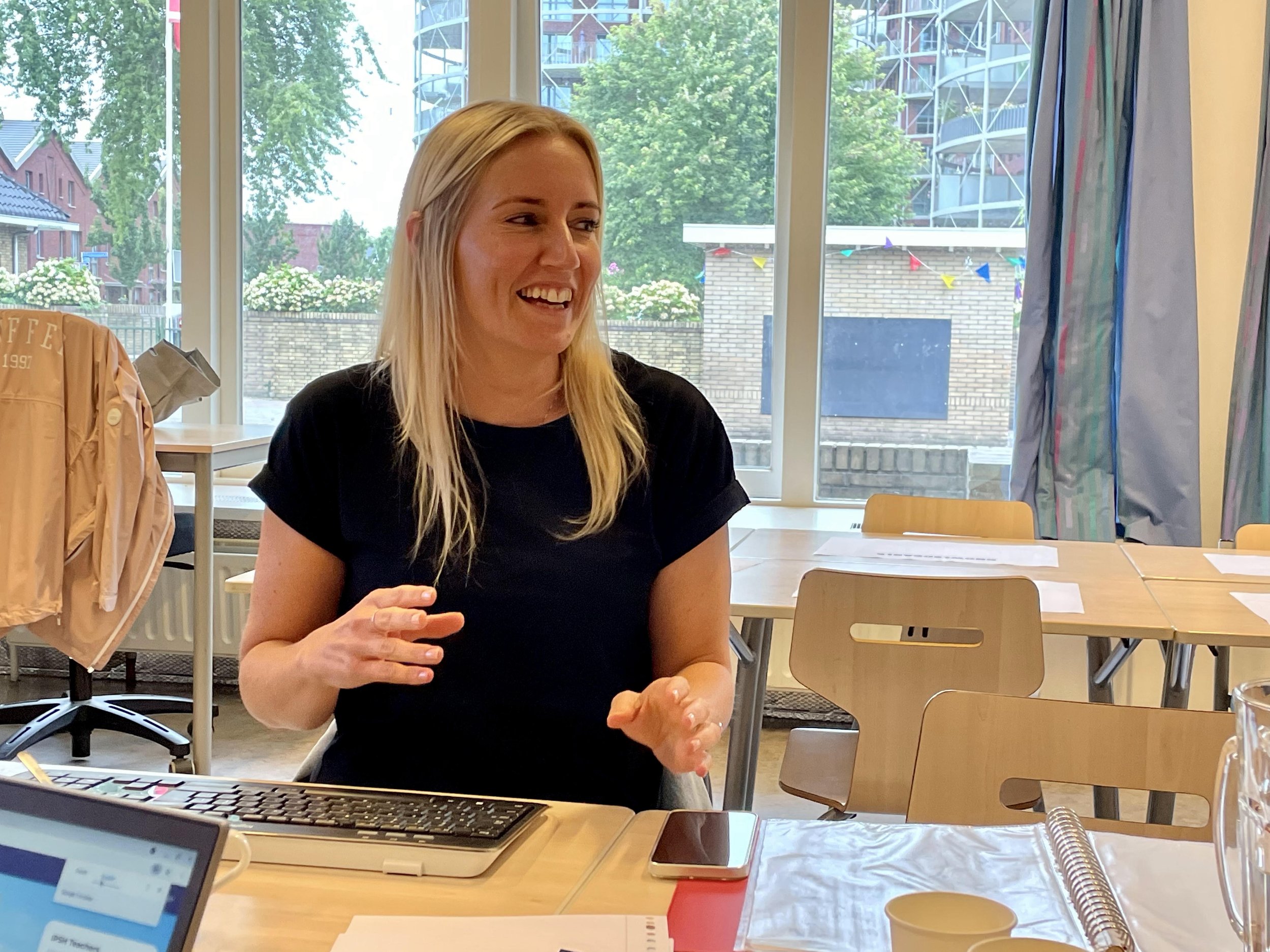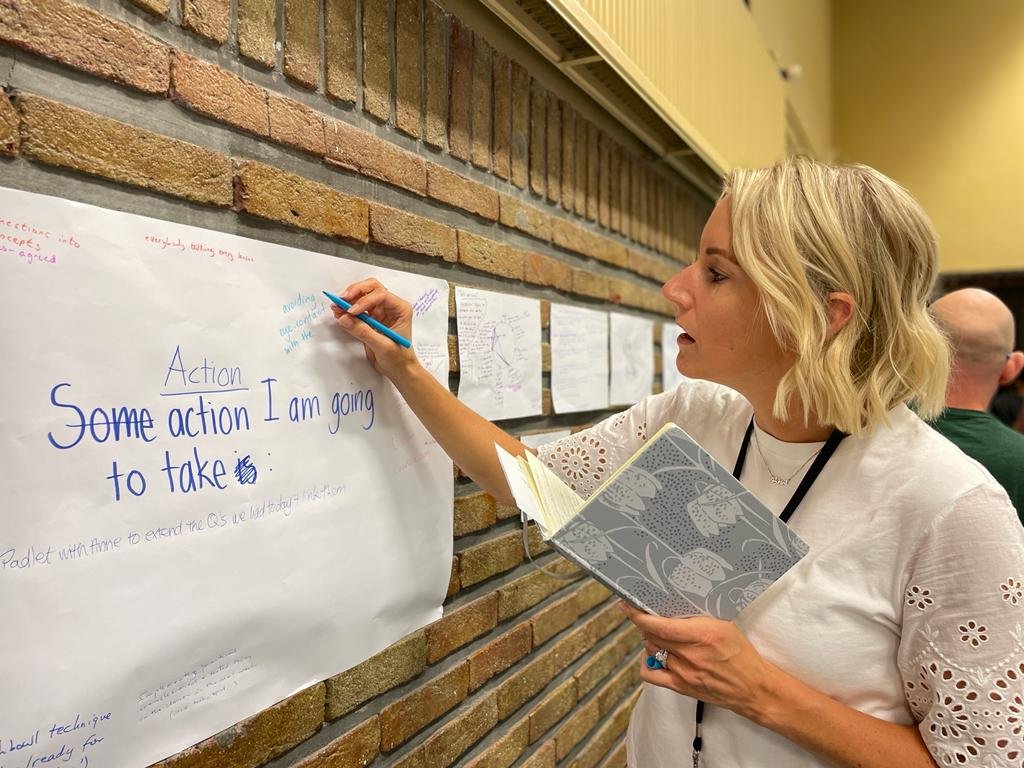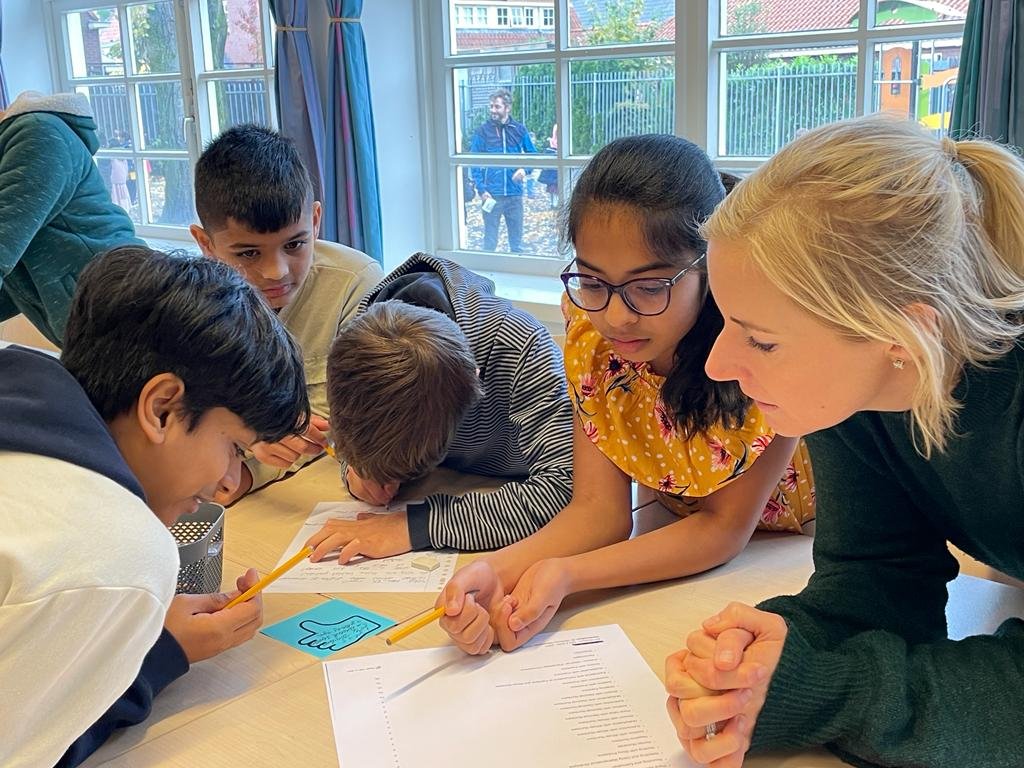Nicola Millward (she/her)
Instructional Coach • IPS Hilversum • The Netherlands
How did you get into teaching?
At age 11 I began my first job as a rhythmic gymnastics coach through a nationwide initiative in New Zealand to develop young coaches. I continued coaching national and international-level gymnasts right through high school and, naturally perhaps, I would often hear, “You should get into teaching!”. Forming relationships with children (who were, in reality, often my peers) and supporting them in nurturing and developing their interests and talents had become a strength and, therefore, teaching seemed like a natural progression. I had initially planned to be part of the first cohort in New Zealand to study a Bachelor’s degree in Dance, however that felt far too specific for someone like me who loves variety. So, primary education it was!
Who was the teacher who made the most positive impact on your life?
My PE teacher during my last two years of high school was a young teacher named Tanya Dalton (née Nicholson). She played netball for New Zealand and, not only did we all look up to her, we also admired her ability to travel the world with the Silver Ferns and then walk back into the classroom the next week and be so connected to us and her teaching practice. Several years ago, Tanya tragically passed away and it was a real moment of reflection for me about the true extent of the impact she had on me not only as a student but as a teacher. I realised that I had modelled the interactions with my own classes on the way in which she was able to connect with us. We had fun with her, there was mutual respect, she challenged us as people, developed relationships with us beyond the four walls of the classroom, and then she focussed on the content. This same focus on people first and building and nurturing relationships is what I have based every interaction with students on during my teaching career. It is also what I have gone on to now prioritise most as an Instructional Coach and within leadership.
What is a professional inquiry you are currently pursuing?
How do I measure and sustain my impact?
Four years into my journey of developing a coaching programme in my school from the ground up, I reached the point where I needed outside perspectives and a moment to deeply reflect on the programme and my practice. The coach needed a coach! Under the recommendation and encouragement from my principal, Paula Baxter, I’m now half-way through a year-long deep dive into the art of instructional coaching and refining my current programme framework through The Coach Certificate and Mentorship Program with Eduro Learning. During the first phases of this course, it became apparent to me that, whilst I wanted to continue diversifying the ways I could support teachers and remain dynamic and innovative in my ways of working, there was a real need to also maintain a consistent approach, which ensured teachers felt a sense of familiarity and, therefore, were comfortable enough pushing their own personal boundaries and leaning into cognitive discomfort. Creating a Twitter account as a 12 month “test-drive” of establishing a PLN on social media, inspired again by coursework modules, turned out to be a powerful way of broadening my connections and gathering a myriad of perspectives and inspiration. This has also led me to the work of Elena Aguilar and I’m now exploring, The PD Book: 7 Habits that Transform Professional Development (Aguilar & Cohen) and The Art of Coaching Teams (Aguilar), both of which are supporting my growth not only as a facilitator of adult learning but also in how I engage emotions and lead for equity. After coaching for 18 years in various capacities, this is the first year I have truly stopped to whole-heartedly concentrate on my own growth as a coach. Afterall, if I can’t stop to ascertain the impact of my role on teaching and learning, then how can I expect those who I work with to stop and make the time to reflect on their own practice?
What is a personal inquiry you are currently pursuing?
Where to next?
Though it might not feel like a distinctly personal inquiry, the one thing dominating my personal life right now is the question of: Where to next? For 15 years now my family and I have been living away from New Zealand and enjoying the freedom that comes from my husband and I having jobs that allow us to move (more or less) where we please. In the past, our moves were usually through my husband’s playing and coaching contracts for rugby. However, having now finished up as coach of The Netherlands rugby team, we have the freedom once more to scratch the proverbial (and perpetual) itch and move onwards. So now the question has become: what’s important to us in our next relocation? What has become very clear during the pandemic is how isolated we are from family when we are living so far away. Especially with two small children, it is difficult to take two long-haul flights for short visits. I haven’t seen any members of my family for three years now, thus providing us with an answer: we want to be closer to New Zealand. Not back in New Zealand…yet…but closer. So, as I look ahead to the next school year, job prospects in Asia are our focus; being one flight from New Zealand would ensure we get home more often and that we are more accessible to friends and family.
What three best ideas you have to improve the teaching profession?
To be a good coach, I am always thinking as a teacher. These three ideas below apply to the interactions I have with both adults and children as learners.
1.RESPONDING WITH WONDERMENT AND AWE
Habits of Mind (Art Costa) were the first set of attributes/competencies that I was introduced to in my teaching practice and the habit of, ‘responding with wonderment and awe’, is something I have consciously carried with me ever since, as an inquiry teacher and learner. As humans we are innately curious. It’s how we learn and make sense of the world around us. It can also bring us joy, direction, and a sense of appreciation for that which we encounter. However, we tend to find as we get older that we are not so outwardly curious, often internalising our inquisitive nature. When working alongside both children and adults, I always strive to convey a sense of wonderment and awe about not only my own learning and discoveries, but that of others, too; to pull people in! One of the biggest compliments I received as a facilitator came in the form of feedback, that I “come to each collaborative planning session as if the unit doesn’t exist”. Maintaining this inquiry stance in all facets of school-life is so integral in ensuring we are always open to the opportunities that are or may be presented to us, as well as the perspectives of others which may lead us in different directions than we would have on our own. Sometimes even just the language we use helps to keep this curiosity alive. Teachers new to inquiry and the PYP will often hear me talk about questions versus wonderings. From my perspective, questions can often imply a need for a distinct, complete and succinct answer. Wonderings, I find, lead us to discoveries which, many times, bring further wonderings. And here the cycle of curiosity and inquiry, of wonderment and awe, is born and thrives!
2. PEOPLE FIRST
Prioritising a sense of belonging and community is just as important in our student-centred learning spaces as it is with teams of educators. We all know it to be true that when people see and feel they are valued and that their expertise is honoured, they are prepared to commit themselves to one another, the ideas of the group and a shared approach to a goal. If we truly value what we each bring to the table, then we allow space for genuine agency. It’s time to shift our thinking from believing we need to give members of our learning community a voice and realise the opportunities for centering voices. As teachers, learners, peers and leaders it is so important that we take the time to see each other as people first, with all that we have to offer one another, and above all else, that we lead our interactions with kindness!
3. IT AIN’T THAT SERIOUS!
Teaching is fun! Let’s not let ourselves lose sight of that. Whilst I acknowledge the privilege of working in an international setting, where I do see that teachers and leaders are more sheltered from some of the social and political issues that are affecting teachers and education systems at the moment, we have to find ways to remember that we are working with children and it doesn’t need to be complicated or heavy. These are some of the best times of their lives. Afterall, our fondest memories of school are often why we got into teaching in the first place. I believe that when it’s light and fun, we open the doors for the best teaching and learning to take place. It’s needs-based. It’s responsive. It gives space for children to understand themselves as learners. Fun doesn’t mean it’s not challenging or that it’s less cognitively demanding, but that we can at least enjoy ourselves and each other while we’re at it!
You gotta see this!
Last week we went to the local film theatre to see Bigger than Us with our Grade 6 students. If you’re not yet familiar with it, it’s a deeply moving and inspiring look into young people from around the world who are taking action as activists and changemakers.






